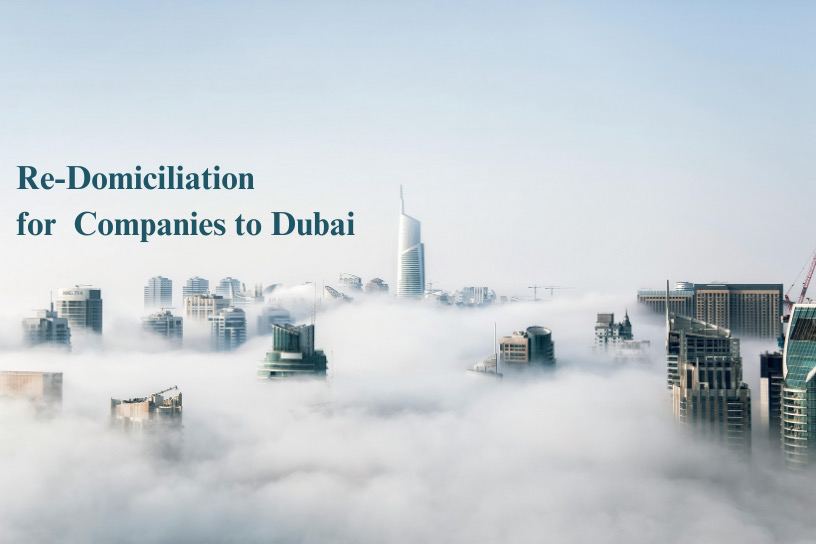Dubai, a leading global business hub, attracts companies from around the world seeking new growth opportunities or aiming to enhance their international presence. Re-domiciliation, which refers to the relocation of a company’s seat or legal structure to Dubai, provides a strategic opportunity to leverage the numerous benefits of this vibrant city on the Persian Gulf.
1. What is Re-Domiciliation?
Re-domiciliation involves changing the legal domicile of a company, while other aspects such as business activities, ownership, and contracts typically remain unchanged. The process can be complex due to varying laws in the respective countries or free trade zones involved, as well as the specific circumstances of the company.
2. Reasons for Re-Domiciliation to Dubai
Companies consider re-domiciliation to Dubai for several reasons, including the favorable tax environment featuring, among other things, a 0% personal income tax rate and double taxation agreements with over 80 countries. Additionally, Dubai serves as an international financial hub, offering access to numerous international and local banks, as well as a wide range of financial and legal services. Dubai also provides business opportunities not only within the United Arab Emirates but also in neighboring countries such as Saudi Arabia. Companies relocating to Dubai can choose to establish their operations in specialized business zones (free trade zones) limited to specific business activities or in the Dubai mainland, which generally allows all business activities. Since 2015, non-UAE individuals and companies controlled by non-UAE persons can establish businesses in free trade zones or the Dubai mainland without requiring a local shareholder.
3. Re-Domiciliation Process from Switzerland
The re-domiciliation process must occur simultaneously in Switzerland and Dubai. In Switzerland, re-domiciliation requires, among other things, the approval of the general meeting to adhere to a different legal system, a public debt call, and confirmation from the competent tax authority. In Dubai, the company must obtain various confirmations and approvals, which may vary depending on the specific free zone or mainland jurisdiction.
3.1. Re-Domiciliation Process
In Switzerland, pursuant to Art. 163 of the Federal Act on Private International Law (“PILA”) and Art. 127 of the Ordinance on the Commercial Register, the following steps are required for a company to transfer its legal entity abroad:
• Issuing a public debt call to all creditors of the company to register their claims within two months.
• Providing sufficient security for all registered claims or settling all outstanding claims.
• Registering the planned re-domiciliation with the commercial register, including documents such as:
• Confirmation that the company continues to exist under the applicable foreign law.
• Auditor’s report confirming settlement of all outstanding debt.
• Resolution of the general meeting approving adherence to foreign law.
• Approval from tax authorities of the canton.
• Removal of the company from the commercial register. The public debt call is a critical component of the process, conducted in analogy with Art. 46 of the Merger Act. Potential creditors are notified three times via announcement in the Swiss Commercial Gazette to register claims against the re-domiciliating entity and request security for their claims.
3.2. Alternative: Transfer of Assets
As an alternative to re-domiciliation, a company may opt to transfer all or part of its assets to a newly established legal entity in the UAE. According to Art. 163d PILA in connection with Art. 163b PILA, this transfer is permissible under the following conditions:
• Confirmation that assets and liabilities are transferred to a newly established UAE company and that the transfer is permissible under UAE law.
• Assurance that shareholders’ rights will be adequately maintained in the UAE company.
• Compliance with all provisions of Swiss law regarding the asset transfer.
• Entry into an asset transfer agreement between the Swiss and UAE companies.
• Valid resolution from the Board of Directors approving the asset transfer agreement.
• Adherence to the applicable provisions of Art. 69 et seq. of the Swiss Merger Act. Asset transfers do not require a public debt call or arrangements for security of potential creditor claims; however, both the Swiss and UAE companies are jointly and severally liable for all creditor claims.
3.3. Requirements under UAE Law
It is essential to consider Dubai’s requirements, which depend on whether the entity is to be established in a free trade zone or on the mainland. Generally, the respective authorities require confirmations of good standing and compliance with all relevant regulatory requirements in Switzerland, as well as Arabic translations of relevant corporate documents. Requirements vary depending on the chosen venue of establishment.
Concluding Remarks
In conclusion, re-domiciliation to Dubai offers various benefits such as lower tax rates, access to a dynamic business environment, and international renown. However, the complexity of the process necessitates professional legal advice, particularly concerning each individual case. Thorough analysis of the advantages and disadvantages, along with assessment of long-term implications, is crucial to ensure that the re-domiciliation aligns with the company’s strategic objectives and is successfully implemented.
If you would like to find out more about this topic or would like to request consultation, please contact us!
Transactional and Corporate Matters
Our attorneys have worked on a number of national and cross-border transactional and corporate matters. Our extensive experience helps clients navigate through every step of the deal in the rapidly changing regulatory and geostrategic environment. Moreover, we are also well versed in the area of corporate governance, advising newly formed and mature companies across industry sectors, advising management and boards of directors on a broad array of corporate governance and related matters. In addition, we represent our clients in matters related to mergers & acquisitions and cross-border transactions.




